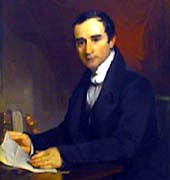John Sergeant (politician)
John Sergeant (born December 5, 1779 in Philadelphia , Pennsylvania , † November 23, 1852 there ) was an American politician . He was the National Republican Party candidate for vice presidency alongside Henry Clay in the 1832 presidential election .
Life
John Sergeant was a member of a family that produced numerous politicians; so his father Jonathan was a delegate to the Continental Congress . His grandsons, John Sergeant Wise and Richard Alsop Wise, sat for Virginia in the House of Representatives , and his great-grandson, John C. Kunkel, for Pennsylvania.
After attending public schools and the University of Pennsylvania in Philadelphia, Sergeant graduated from Princeton College in 1795 . He then trained as a lawyer and was admitted to the bar in 1799, whereupon he practiced this profession for the next 50 years. In 1800 he became Deputy Attorney General of Philadelphia; thereafter he was a bankruptcy administrator ( Commissioner of bankruptcy ) in government services.
politics
Sergeant served in the Pennsylvania House of Representatives from 1808 to 1810 before being elected to the Washington House of Representatives as a Federalist . There he took the place of the late Jonathan Williams from October 10, 1815 ; after being re-elected several times, he remained in Congress until March 3, 1823 , during which time he was chairman of the judiciary committee . He supported Henry Clay's economic program and the establishment of the Second Bank of the United States . He was also an opponent of slavery and the Missouri Compromise .
As a result, Sergeant was President of the Pennsylvania Board of Canal Commissioners and envoy to the Panama Congress under the direction of Simón Bolívar in the summer of 1826, before he was a member of Congress from March 4, 1827 for another two years. After a failed re-election, he worked as a lawyer for the Bank of the United States .
In 1832 Henry Clay named him his running mate in the election for US president . However, they were only able to win a majority in six states and were therefore clearly subject to the Democratic incumbent Andrew Jackson and his vice-presidential candidate Martin Van Buren . Sergeant then initially retired from politics, but then entered the House of Representatives again in 1836, this time being elected as Whig in Congress. There he remained from March 4, 1837 until his resignation on September 15, 1841, where he was again chairman of the judicial committee. During this time he also served as President of the Constitutional Convention of Pennsylvania in 1838.
John Sergeant then concentrated again on his work as a lawyer. During the time that the Whigs were the US president, he was offered offices in government or in the diplomatic service, but turned them down. He died in his hometown of Philadelphia in 1852.
Web links
- John Sergeant in the Biographical Directory of the United States Congress (English)
- John Sergeant in the database of Find a Grave (English)
| personal data | |
|---|---|
| SURNAME | Sergeant, John |
| BRIEF DESCRIPTION | American politician |
| DATE OF BIRTH | December 5, 1779 |
| PLACE OF BIRTH | Philadelphia , Pennsylvania |
| DATE OF DEATH | November 23, 1852 |
| Place of death | Philadelphia , Pennsylvania |
